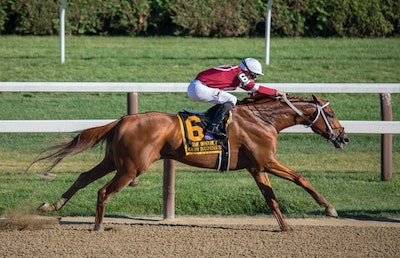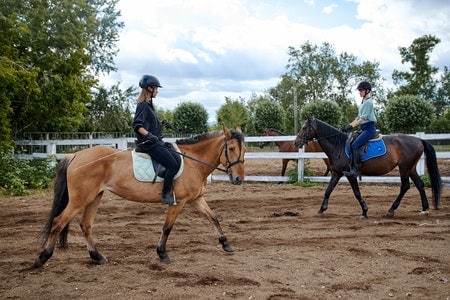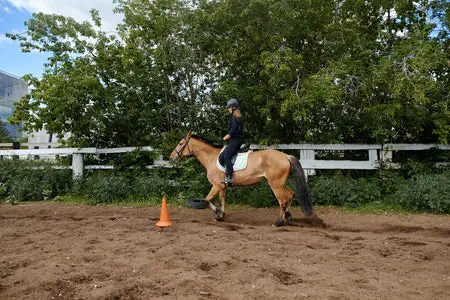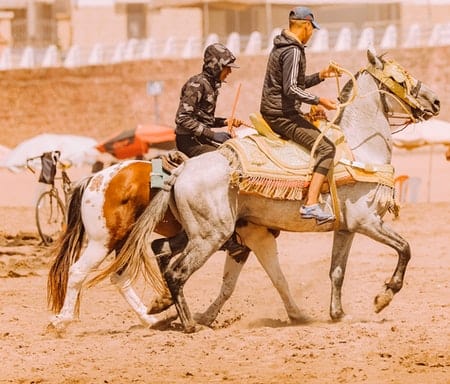Not a fortune! If you could afford a horse, you can take proper care of the horse and if the horse is for sports or some profitable activity, the horse may just earn you enough to even have some savings. This is not to say you cannot manage all that it takes to own a horse that is kept for riding as a hobby.
There are essential things horses need to survive and much more is needed for them to be in great shape from physique to strength. Everyone including yourself desires to have their horses in the best of state but there have been limiting factors such as the global economy with regards to the payments of services employed and purchase of feeds amidst other things.
Hence, it is essential to have it established first that the cost depends on YOU. From your location to the available resources (natural or imported), it goes as far as your decisions to purchase hay or growing of pasture. If you create the time and possess the experience to care for a horse, a major part of the cost or expense is done with.

Horses have diverse breeds and so is the care each requires but on a general view, all horses need daily care. The daily care is also dependent on the system an individual adopts which could be keeping horses in a field all day or turned out at day and stabled at night.
They require checks for injuries and their state of well-being daily.
Continuous water supply is also essential daily, amidst many other basic things they should be provided with such as proper grooming, maintenance of hooves by a farrier, changing of rugs, regular deworming, and exercise (1). This post gives an insight into some needful expenses and what the care of a horse entails.
The cost of caring for a horse
Of course, before the concern of the cost to care for a horse, you should either have a horse or know how to get one. After such expenses even if obtained as a gift, you must have all that is required to care for it.
It is best considered from the long-term perspective because horses have a life expectancy of 25 to 30 years, of which you will be responsible except you have plans of selling it after a specified period. (2)
These costs will be classified into:
- Basic costs
- Sudden costs
- Personal interest costs
- Emotional costs
-
Basic costs
There must be basic routine care for every horse as they have certain constant needs. The price varies across stables depending on location, services rendered, self-care, or full board, amidst other factors. The monthly cost can range from $300 to $3000, depending on the factors earlier mentioned (3).

Every horse owner is to keep in mind that vaccination schedules are to be properly discussed and agreed upon with a veterinarian based on the need of the horse and recommendations made based on regions. Hoof care by a farrier should be kept in mind as well, which is advisable every 5-6 weeks.
If you keep your horse on personal property, it is essential to have an idea of the basic costs as well. Before the basics, it’s essential to be reminded that good bedding will need to be put in place as well as pasture fences and certain utilities. Some basic costs you will have to bear include (4)
i) Feed and Hay
The quantity consumed by the horse depends on if it is allowed to graze on grass on the fields or not. If not, the consumption rate is higher and it has been proven that a healthy horse consumes feed and hay that costs about $100 to $250 average every month.
It is essential to note that hay is cheaper in the suburbs and the cost depends on the season of the year, the quantity, and the type. Mineral supplement, salt block amidst others are also advisable.
ii) Maintenance
These are general responsibilities to aid the procurement of a proper and healthy environment for the horse which also entails the care of the horse itself. These include the proper care of the shelter (barn or stable), equipment, and bedding. This cost depends on personal property and required services.

Some one-time purchased equipment or tools are to be properly maintained to avoid the cost of re-purchasing them. Services needed include farrier and grooming; farrier entails the trimming of the horse’s hooves, which costs about $50 monthly. Shoeing costs more depending on location whether in a city or the suburbs and it is important to know some horses with cracked hooves need corrective shoeing.
Brushes (hard or soft), combs (mane and tail), hoof pick, face sponge, buckets, and sweat scraper are for grooming and their cost depends on quality which is approximately $100 altogether.
iii) Health care
Veterinarian bills are to be planned as some are basic but proper savings should be considered to this regard. Vaccination and teeth cleaning are musts for veterinary visits every year. Though emergency care can cause a significant rise in veterinary expenses, some saved funds will be very useful.
Deworming should be done every month or quarterly which ranges from $100 to $250 with regards to location. Certain surgeries can also cost as high as thousands of dollars, one is colic surgery amidst others.
Regular standard checkups and immediate care for minor injuries are advisable to avoid complications.
-
Sudden costs
Sudden as implied, not planned. A good horse owner should keep funds for unplanned occurrences. This ranges from an increase in payment for boarding (which is beyond your control), a sudden increase in the price of hay, or veterinary care.
There may be possibilities of expected illness at some point or the other based on weather and season but you do not know when in particular. Injuries also just happen and to properly take care of such is a requirement for funds. Payment for the care of minor or common health issues increases with the duration it lasts for which you cannot influence as well.
Equine insurance is advisable if there is one in your area and all horse owners must have savings or funds for sudden costs.
-
Personal interest cost
Everyone wants to look good when going for a ride and if an owner wants to go for a ride, some necessities add up. This includes proper clothing such as gloves, helmets, boots among others.

Some things are a must for a ride like a saddle, bridle, or halter whose cost depends on location. These proper clothing are not luxury or for fun because it ensures the safety and if you have extra protective wear you can afford as you enjoy the ride, why not?
Before enjoying a ride, proper training is advisable whether the horse already has been through basic training or not. Additional training is never too much depending on certain parameters though you should have been told that some horses are headstrong and you need to be sure that the horse will obey your commands during a ride.
Also, every individual needs to learn how to take proper care of, approach, and ride the horse properly to avoid casualty. All these have a cost and need to be done by a professional which is strongly advised.
-
Emotional cost
Anything you can spend on is something of worth not to talk about the cost to care for a horse. Beyond all the above expenses is the emotional cost which entails time aside from the financial resources already invested. Regardless of your state of mind, plans, or weather, horses need daily care, which consumes a part of everyone.
This becomes a commitment which you need to fix into your schedule. You might have paid for as many services as you desire, but everyone wants to get accustomed to their horses. If you took some of these responsibilities on yourself, you should know it takes more than 2 hours daily to take proper care of a healthy horse and more for a sick horse.
It is important to be aware of the possibilities of injury sustained by a horse which in a way can affect your responsibilities or even work. If health complications go beyond a level that cannot be taken care of despite professional advice and counsels, every owner makes the hard decision of possible unsuccessful and expensive surgeries or euthanasia.
Conclusively, despite the issue of personal finance, it is essential to know that every horse needs to be given access to basic care. It is clear enough that everyone will agree that although it costs reasonably high to keep a horse, it is still affordable.
Sources
2) The real cost of horse ownership.

